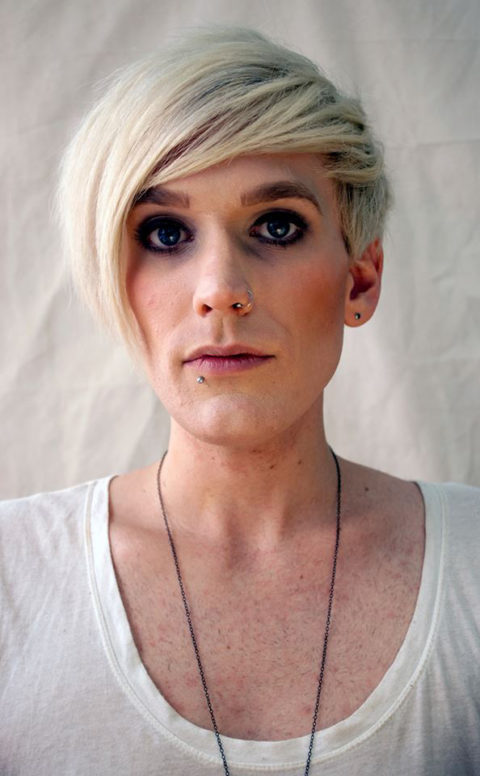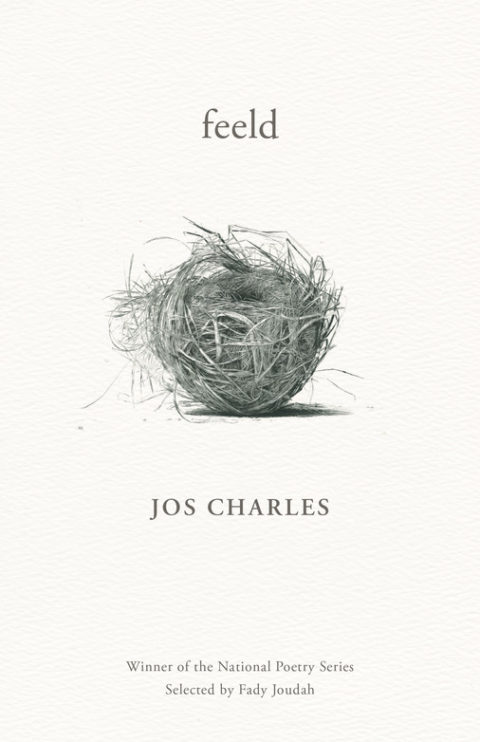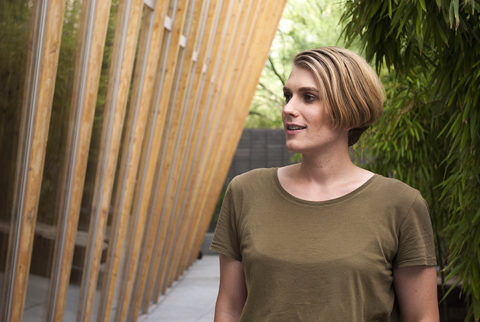It’s worth asking, as I’ve been asking myself for months, why Jos Charles’ feeld— a book-length sequence of poems about contemporary life written in a kind of faux Middle English — doesn’t feel gimmicky.
Part of the answer must be that it offers a surprising way of being queer, of allowing Charles, a trans woman, to stand at an odd angle to a dominant culture in which “not a monthe goes bye / a tran i kno doesnt dye.” But it matters at least as much that the strangeness of her style so often resolves into something clear and alert. The first section reads in full:
thees wite skirtes / & orang
sweters / i wont / inn the feedynge marte /
wile mye vegetable partes bloome /
inn the commen waye / a grackle
inn the guarden rooste / the tall
wymon wasching handes /
or eyeing turnups
/ the sadened pwres wee rub / so economicalie
inn 1 virsion off thynges /
alarum is mye nayme
/ unkempt & handeld
i am hors /
i am sadeld / i am a brokn hors
 It helps to know, as the poem rushes into the terribly plain, small, slowly expanding sentences that make up its last two lines, that Charles’ estrogen is made from “the urin concentrat off pregnynt mares.” But there is also an immediacy there, underneath or inside or maybe right there in the visible mediation of the spelling, that lets the lines live prior to that explanatory knowledge. Here, and in so many of the book’s best sections, Charles feels remarkably sincere and vulnerable. The words, the lines, the poems, both resolve and “bloome,” opening into magnificence even as the guiding imagination refuses to pause. (Look, for example, at how many times she shifts the attention of the poem’s first sentence, which, in my reading, continues all the way to “economicalie.”)And the initial feeling of strangeness yields, a little slowly — gently, even — to sense.
It helps to know, as the poem rushes into the terribly plain, small, slowly expanding sentences that make up its last two lines, that Charles’ estrogen is made from “the urin concentrat off pregnynt mares.” But there is also an immediacy there, underneath or inside or maybe right there in the visible mediation of the spelling, that lets the lines live prior to that explanatory knowledge. Here, and in so many of the book’s best sections, Charles feels remarkably sincere and vulnerable. The words, the lines, the poems, both resolve and “bloome,” opening into magnificence even as the guiding imagination refuses to pause. (Look, for example, at how many times she shifts the attention of the poem’s first sentence, which, in my reading, continues all the way to “economicalie.”)And the initial feeling of strangeness yields, a little slowly — gently, even — to sense.
That strangeness records not only alienation but affection. Charles, who according to at least a few online bios is working on a Ph.D. in medieval literature, seems to have a genuine love for the language and traditions her spelling evokes. And among the book’s many implicit claims is, as my friend Gaby pointed out, that trans people have always been here, speaking and shaping our languages even as they (in most cases) were forced to hide inside notions of sex and gender that wouldn’t accommodate them.
The poems move. They are capacious. They take a range of concerns into the body they compose, and, when successful, they manufacture remarkable unities. In a smart review of feeld for Kenyon Review Online, BK Fischer wrote “feeld is a hermeneutical workout, error inbuilt in the act of reading at every step…” and, a little later, “Meaning is relentlessly multiple, and piecing together the resonances of Charles’s artificial orthography leaves the reader both fascinated by and unmoored in the fields of discourse her speakers inhabit.” I agree up to a point, but I don’t think feeld would be nearly as interesting as it is if those multiples and uncertainties really did dominate the book to that extent. “thees copse” could definitely refer, as Fischer points out, to “a small grove of trees” or the police. The phrase concludes a poem that cracks open into direct address, ending:
a whord
is just the thynge
conveyed / & inn
this whorld /
monica /
u r free / 2
call thees copse
 Outside of “copse,” though, the words here mostly resolve to a single meaning, and the indeterminacy of the poem’s final word (which redounds to “call”) is meaningful because the lines leading up to them are able to hold both possibilities inside a larger whole, a conveyed, imagined world in which monica — presumably herself a trans woman — is both able to trust in the power of the state to protect her and to name the pastoral scene she encounters, using a term that reaches back in English, in an earlier form, to the 14thcentury.
Outside of “copse,” though, the words here mostly resolve to a single meaning, and the indeterminacy of the poem’s final word (which redounds to “call”) is meaningful because the lines leading up to them are able to hold both possibilities inside a larger whole, a conveyed, imagined world in which monica — presumably herself a trans woman — is both able to trust in the power of the state to protect her and to name the pastoral scene she encounters, using a term that reaches back in English, in an earlier form, to the 14thcentury.
Even as being openly trans moves one toward a public identity that is queer (what Charles calls “a tran” throughout), it also moves those who make a full transition toward an established category in mainstream society — “woman,” in Charles’ case — and in doing so, moves them closer to themselves. Charles implicates herself in our world of commerce and fantasy, as in the first lines of the book, above, where her wanting (it could, I suppose, mean “won’t,” but in context, that feels like a reach) points toward something to buy. The wanting leads to loneliness and fear, an awareness of herself as a perceived threat, and therefore threatened. But that doesn’t read as a criticism of the wanting, at least not to me. Rather, it records her presence as a vulnerable human alive in this world where there should be a version in which she can safely do something as otherwise trivial as wanting a skirt — or going to the bathroom, which she refers to throughout as “the feemale depositirie room.”
The second poem begins with Charles standing in line for the bathroom, and it concludes:
were that i were goldenne
mye rayte / the tayste off gold
inn eggs / crayvng a room
just emtied enuff
2 curl myeself
inn / thees the dreggs / the grl beguines
Once again, the poem ends in something remarkably small and vulnerable and direct — its speed and variety halting in the sudden control of something that seems masterfully unguarded. The hungering for a place of safety, an embryonic home, alongside the hunger to be valued — and the location of that in something as seemingly elemental as an egg, which itself blooms into magnificence in “the tayste of gold / inn eggs,” and which of course tangles in assumptions about what a woman is, and where a woman (or a man, or non-binary person) comes from: there “the grl beguines.”
feeld is forever turning and returning to pastoral scenes and images. Surely that’s no accident. The pastoral, like a field, is something made of nature. Charles consistently and compellingly depicts her body as something both manufactured and real — which, she suggests, is true of all human bodies in their various ways. Folded and invaginated — to use two of the many words that she repeats with noticeable frequency— her specific body proves remarkably agile, and it takes in a remarkable amount: violence, childish play (one poem ends “boyes r not alowd in this pome”), commerce (she refers, for example, to her “usurous breasthes”), the power and failure of words (she frequently uses “speech” as a verb, and it most often has a direct object), love (the beautiful, final poem includes a reference to “mye hunsbande”), nationalism, identity (“o / u who unforl me / how manie / holes wuld blede / befor / u believ / imma girl”), and nature.
At times, it doesn’t work. In the book’s less persuasive sections, Charles’ varied concerns stay varied, and the spelling starts to feel like a lose garment draped over statements that haven’t achieved a more vital coherence, as in these lines from section LII:
2 be lyrick / with oute
sownde / inn the end even
to be / clothed
inn tactic / everie wher
the sirfase extends / &
it is tragyk / being under
stood / any 1 of us wuldve dropd
more / if we culd
To my ear, at least, those statements never quite add up to more than themselves, and maybe as a result, they never stand out in their own right, either. They never add up to what Maggie Nelson described in The Argonauts, drawing from D.W. Winnicottt, as:
the collected, primary sensation of aliveness, “the aliveness of the body tissues and working of body-functions, including the heart’s action and breathing,” which makes spontaneous gesture possible. For Winnicott, feeling real is not reactive to external stimuli, nor is it an identity. It is a sensation — a sensation that spreads. Among other things, it makes one want to live.
Compare those lines to the following excerpt, from the section that precedes them:
so bareablie frale / so i shoveled seed / i scattred
layres off bone / i said look at the firmament off mye
bone / look at the creem of mye sackerine fase / flatend
2 a slim room / thank you fore the room & the hole i
deposit myeself 2 / thank u fore the tree / however
breef its glome / inn those dayes / I believed
inn unfolding 2 a flore / i still cant with wut u sawe
 There are moments here where the poem eludes me, and the thanks that Charles offers shiver with an irony I can’t quite weigh, anymore than I can say with confidence if the “u” that ends the poem is the same as the one she thanks. Still, this passage persuades me, as so much of feeld does. It feels — and I think this, as much as anything, is why it doesn’t seem gimmicky to me — natural. Its quick movements and its slow resolve, its taste for beauty and its fragile openness, they all ultimately feel natural in the way that an English garden might — composed; beholden; obscuring as much as it shows; and yet also actual, habitable, mobile in its stillness, welcoming within its enclosure, inviting to song.
There are moments here where the poem eludes me, and the thanks that Charles offers shiver with an irony I can’t quite weigh, anymore than I can say with confidence if the “u” that ends the poem is the same as the one she thanks. Still, this passage persuades me, as so much of feeld does. It feels — and I think this, as much as anything, is why it doesn’t seem gimmicky to me — natural. Its quick movements and its slow resolve, its taste for beauty and its fragile openness, they all ultimately feel natural in the way that an English garden might — composed; beholden; obscuring as much as it shows; and yet also actual, habitable, mobile in its stillness, welcoming within its enclosure, inviting to song.
When I first starting thinking seriously about feeld, I tried shifting some of its poems into contemporary spelling, and for the sake of comparison I also tried rendering some poems by other poets in something that approximated Charles’ spelling from feeld. I’ve refrained from using any of that up to this point out of fear that it would be akin to dead-naming or mis-gendering. In arguing for these poems as natural, I’ve been thinking of that as a version of the naturalness — the sense of reality — that each trans body, like any human body, deserves. I’m not sure that my fear is valid. We often make too much of metaphors when we describe how poems work. And the spelling, as important as I think it is to the power and beauty of these poems, is not integral to them in the way that, for instance, estrogen, or the name Jos, must be to Charles. Still, I’m inclined to refrain from using it here. It’s an easy enough experiment to conduct on your own. For now, I’ll just describe what I felt, holding them side by side.
In lines like these, from the initial poem, the spelling “inn” enlarges the meaning in a small way, sweetening it with an image of shelter:
wile mye vegetable partes bloome /
inn the commen waye / a grackle
inn the guarden rooste / the tall
wymon wasching handes /
But if that were all there were, it wouldn’t add up to much. There is a gentleness that the spellings introduce, a humility, almost — strange as that sounds to say. The lines feel more patient, and the spellings let the speed of the poem hold its shape even as the reading (and so the heard voice) slows. An older notion of beauty seems viable here, crafted and bounteous. The “vegetable partes” and the “tall /wymon wasching” — even though the latter will quickly turn threatening — hold open a wishfulness not unlike the wanting with which the poem opens. The poems seem, without illusion, to be trying to make a home, not only for the parts of her experience that are still rendered unspeakable in so much of our public conversation, but for her, for who she is and what she cherishes. And in that, there’s a remarkable compassion, and the spelling, it seems to me, is part of that.
In an interview with Charles, Kaveh Akbar referred to the book’s “persistent bend towards awe,” continuing: “The gesture I keep returning to in many of the poems seems to be its looking outwards, a radical turn towards the world. It seems founded in wonder.” And so it seems to me. The bend that Akbar refers to is often hard and easily refuted, as in the attempt to make a bow submit to the length of its string; there is so much violence here, and still so much of the forces that were arrayed against Charles when, as she writes, “i wanted so much / 2 speech / the hewman thyngs.” But their presence and power also registers her achievement, and the profound importance, as in these lines, which begin in concession and yet move on, undeterred, to the majesty of making beauty, and making her body, its experience, embodied here, real:
the feeld is an affect yes / but wut
mattres more / than its fakt / faktual the folde / inn its
fallow / & bent daye / mattrynge / how wee call a
thynge / & wut / did wee make then / being so tall /
the daye being olde / sum fakts / stunnynge the aire\
* * * *
[Published by Milkweed Editions, August 14, 2018. 80 pages, $16.00 paperback]